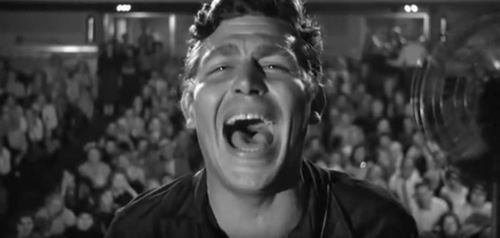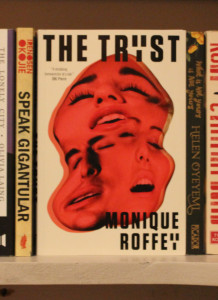Submit your Screenplay to the Festival TODAY
A FACE IN THE CROWD, 1957
Movie Reviews
Directed by Elia Kazan
Starring: Andy Griffith, Patricia Neal, Anthony Franciosa, Lee Remick, Walter Matthau
Review by Jarred Thomas
SYNOPSIS:
A drifter named Larry “Lonesome” Rhodes (Griffith) is discovered by the producer (Neal) of a small-market radio program in rural northeast Arkansas and becomes an overnight sensation.
REVIEW:
Despite coming out in the 1957, A Face in the Crowd is one of the most relevant satirical films to examine the influence of rhetoric and those manipulated by corrupt fame hungry narcissists. Andy Griffith gives his most memorable and frightening performances in any work he’s done since or prior, dominating the film with his over the top character, Lonesome Rhodes. Neal, Remick, and Matthau round out the superb supporting cast in this captivating film by director Elia Kazan.
There is something hauntingly similar to the message the film addresses and what is going on today. Politicians are capable of influencing a mass of people, nation, the world, through simple word choices. Carefully used words that express a larger perspective can win over the minds on any individual, particularly those who take what they hear at face value. Lonesome Rhodes unfortunately, does not have monopoly on rhetoric as too often political leaders win votes simply by telling the people what they want to hear, rather than what they need.
However the rise of television has helped many to spread their word, message, thoughts or ideas to a larger audience, even more than radio. Kazan effectively conveys that notion through Lonesome who uses the medium to gather a following of dedicated listeners who simply adhere to his words because of his charm, not necessarily his point of view. Lonesome appeals to what they like, not what they need.
During the Kennedy/Nixon debate, people watching and those listening had two different opinions on who won the debate. Those watching on television believed Kennedy won because he appeared more calm, collected, more movie star like in contrast to the heavy, sweaty Nixon with the five o’clock shadow. Yet if you listened to the radio, Nixon was the clear winner. It’s this idea that is explored in Kazan film. Appearance is everything and sometimes the only thing. Lonesome Rhodes outer appearance is that of a kind, charming and charismatic man.
Underneath the surface, is a dark, angry hateful individual whose only interest in others is that of need, if he needs them Rhodes will manipulate them to his advantage. He can read people like most politicians, except Rhodes is a TV personality. A larger than life idea that people can respond to whether they agree with him or not.
After being discovered in jail by radio reporter Marcia (Neal) for his candor and crude yet amicable personality, Lonesome is given a job on Marcia’s radio show. Later, he extends his talents to television having his own show and becoming the spokesman for Vitajex, a drug product. Fame is now Lonesome defining quality; it’s everything to him and he seeks to hold on to it. People that work closely with him start to see his real personality come to light, and most are horrified.
It should be noted however that A Face in the Crowd is not about Lonesome Rhodes. Rather the ideas or people he represents along with the media responsible for helping to establish his career and influence on the American people, or people in general. Politicians, celebrities, and news anchors all have a level on influence in the world that greatly impacts the way people think, act, or decide, and not always for the best. A Face in the Crowd was well ahead of its time, and a culturally and socially significant film that echoes many of today’s issues.
Submit your Screenplay to the Festival TODAY






